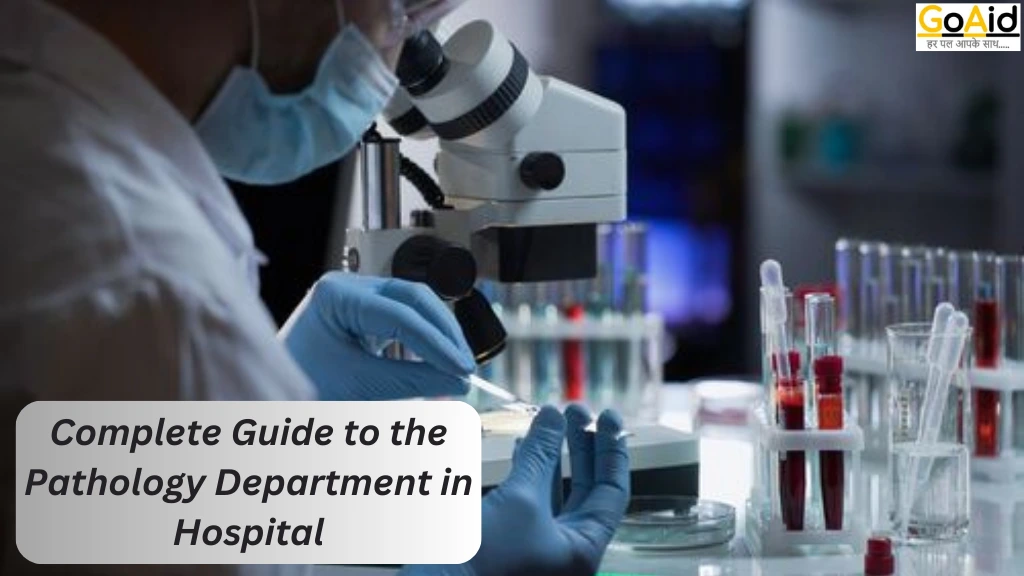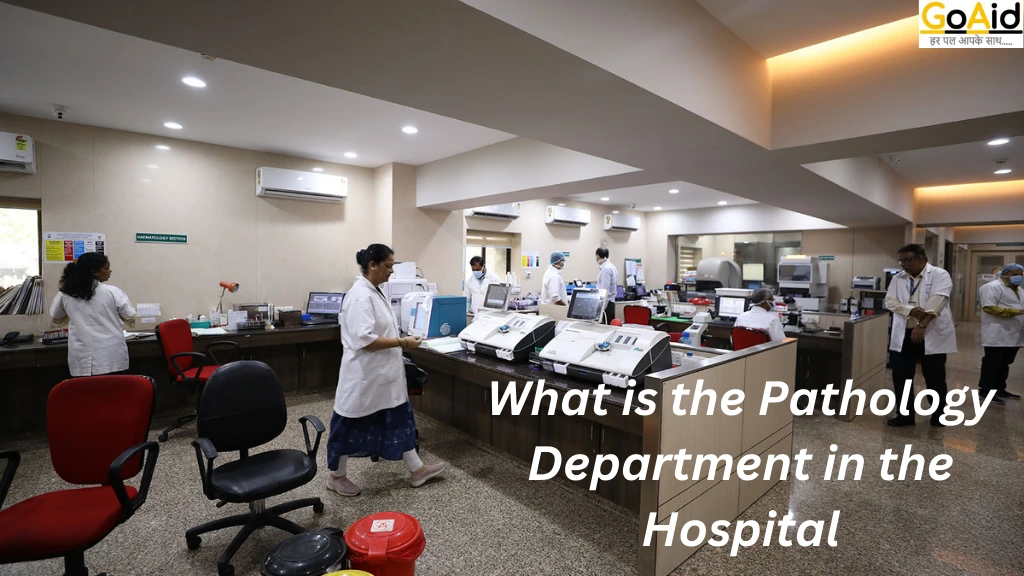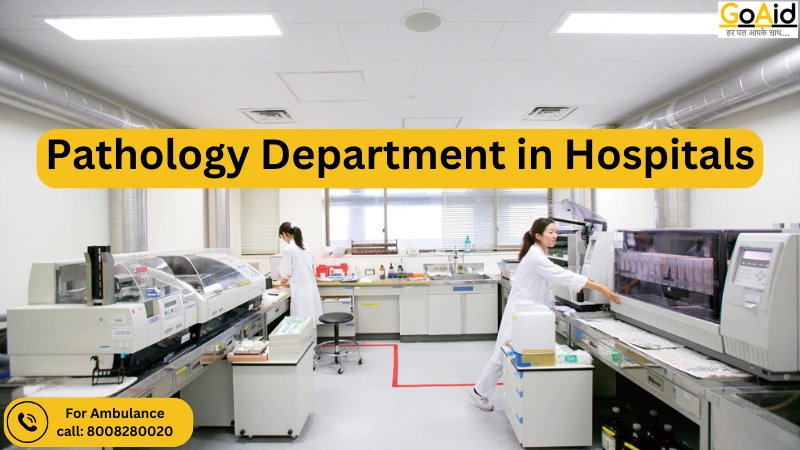Pathology is a department of scientific technology that studies and analyzes disease. The purpose of the pathology department is to examine the tissue to provide correct and specific information about the specific disease. It also provides facilities and equipment for examining body tissues and fluids, concerning receipt of patient specimens and difficulty of reports. Pathologists specialize in infection and disorder, and their testing and reports affect almost every aspect of the affected person’s care.
Pathology departments study new testing techniques and recommend remedy options. It also provides timely, dependable reports, and teaches the students and society approximately the importance of prevention and early detection of diseases.
Complete Guide to the Pathology Department in Hospital

A health center pathology department offers diagnostic records to patients and clinicians through different laboratory tests.
Here is the complete guide about pathology departments:
What pathology department do
Pathologists use a lot of methods to decide the presence of an ailment, along with gross, microscopic, immunologic, genetic, and molecular modalities. They study surgically eliminated organs, tissues, physical fluids, and once in a while the complete frame.
What pathologists specialize in
- Pathologists can sub-specialize in lots of areas, which include gastroenterology, gynecologic pathology, blood diseases, clotting problems, microbiology, lung and breast cancers, and more.
How pathology departments function
- Pathology departments usually have a specimen reception place with centers for registering specimens, sorting benches, and a holding vicinity. After registration, specimens are transported to the applicable laboratory or area for processing and reporting.
How pathology departments contribute to affected person care
Pathology departments provide timely, dependable reports, and teach the students and society approximately the importance of prevention and early detection of diseases.
What is the Pathology Department in the Hospital? ŌĆō What does Pathology mean?

A pathology department in the hospital provides diagnostic records to patients and clinicians through different laboratory tests. Pathologists take a look at tissue samples and body fluids to perceive disorder methods. They use loads of techniques, which includes gross, microscopic, immunologic, genetic, and molecular modalities.
Pathology also includes the related medical examination of disease procedures whereby the causes, mechanisms and extent of disorder are tested. Areas of study consist of cell adaptation to harm, necrosis (demise of dwelling cells or tissues), irritation, wound recuperation, and neoplasia (abnormal new growth of cells), as well as precise issues of the person’s organ structures.
Medical pathology Analyzes body fluids like blood and urine to hit upon chemical modifications. Pathology department department with many divisions that work collectively to complement each other. The department may additionally encompass a reception area, specimen collection vicinity, wards, laboratories, and help regions.
Roles and Responsibilities in Pathology Department in Hospitals
ŌĆóDiagnosis
Pathologists observe samples of bodily fluids or tissues to diagnose situations like viruses, bacteria, and most cancers. They also perform genetic tests to perceive gene mutations that could affect a patient’s analysis.
ŌĆó Treatment pointers
Pathologists can offer guidance on the quality remedy options for an affected person, consisting of antibiotics, radiation, chemotherapy, or surgical procedures.
ŌĆó Monitoring
Pathologists can monitor the development of blood-borne pathogens like hepatitis B with the aid of analyzing blood samples.
ŌĆó Prognosis
Pathologists can offer an analysis for positive conditions, consisting as leukemia, by identifying gene mutations that could have an effect on the patient’s outlook.
Medical microbiologist: Diagnoses infectious illnesses, advises on a way to prevent the spread of disorder and enables hospitals to put into effect manipulative measures.
The Role of the Medical Pathology Department in Treating Cancer

The Pathology Department In hospitals focus on a wide range of illnesses, consisting of cancer, and the significant majority of most cancer diagnoses are made by means of pathologists. The cell pattern of tissue samples is determined beneath a microscope to help determine if a sample is cancerous or non-cancerous.
Here are some of the approaches pathologists contribute to cancer treatment:
ŌĆó Diagnosis
Pathologists study tissue samples and provide the definitive cancer analysis, which includes staging the most cancers and describing its quantity in the body.
ŌĆó Treatment plans
Pathologists use their knowledge to provide diagnostic exams and suggest the best treatment for the specific disease
ŌĆó Treatment response
Pathologists keep an eye on the treatment reactions and do biopsies for evaluating how the tumor is evolving.
ŌĆó Clinical trials
Pathologists also assist in different scientific trials, specifically for patients who don’t respond to conventional care.
No matter how excessive the index of medical suspicion is, the prognosis of cancer is not conclusively set up nor accurately assumed in the absence of a tissue prognosis. With only a few exceptions, a definitive remedy for cancer ought to not be undertaken in the absence of a tissue diagnosis.
Features and Specialties of the Pathology Department
Pathology departments have many specialties, including:
- Medical microbiology and parasitology: A core challenge in pathology this is evolving rapidly.
- Neuropathology: A specialty that specializes in illnesses of the thoughts, spinal cord, and neural tissue
- Hematology: A department of pathology that research blood-associated situations, in conjunction with its motives, remedies, analysis, and prevention
- Clinical pathology: A scientific feature that diagnoses sickness based totally on laboratory evaluation of bodily fluids
- Cytology: A subspecialty of pathology that offers the laboratory exam of cells in samples of body tissue or fluids
- Pathology informatics: A domain that includes medical informatics and involves records- and era-extensive elements
Essential Equipment used in the Pathology Department
- Centrifuges: These machines spin materials at high speeds, which separate additives from each other.
- Microscopes: Microscopes are used to take a look at samples visually, and they want a special setup
- Biosafety Cabinets: Biosafety cabinets are essential for maintaining harmful bacteria in and prying eyes out. Without a bio-safety cupboard, sensitive substances may fall into the incorrect fingers
- Blood Analysis Machinery: Also used in lots of other clinical applications, the wide array of blood checking out machines in a pathology lab is essential to protecting every feasible diagnostic take a look at
- Urinometer: A urinometer is a tremendously specialized side of every pathology lab. These machines are used to decide the particular gravity of a urine pattern.
- Safety Equipment: Finally, every laboratory will need a safety device. In a pathology lab, the mix of chemical substances and biological substances can create dangerous environments. In addition to the everyday precautions and procedures practiced each day, the pathology laboratory system will also include different sorts of emergency protection gadgets.
Dissection Tools
Some of the dissection gear that may be determined in a pathology lab include:
- Bone marrow extractors
- Bone saws
- Scalpels
- Various knives
How to Choose the Best Oncology Hospital in India for Cancer Treatment
While choosing the best Oncology Hospital in India for Cancer Treatment, A person should keep these things in mind:
- Treatment alternatives: One should always check the treatment alternatives which include surgery, chemotherapy, radiotherapy, and supportive care
- Technology: The hospitals should have advanced era for prognosis and treatment
- Oncologists: while choosing Oncology departments in the hospital, one should always confirm Whether this hospital has skilled oncologists
- Research: Complete research should be needed to know Whether the hospital prioritizes studies and innovation
- Accreditation: The hospital should be authorized by a relevant organization or government agencies
Book Ambulance: GoAid Ambulance Service
Conclusion to the Pediatrics Department
The Pediatrics Department in hospitals focuses on the medical care and remedy of toddlers, youngsters, and youngsters. Pediatrics is dedicated to diagnosing and managing more than a few infant-associated health conditions, which include the ones requiring specialized care inside the Pediatrics ward. This branch is a critical part of the healthcare device that gives specialized care of young sufferers. It’s more about just treating ailments, but additionally, it nurtures the overall well-being of youngsters and their households.
FAQ
Question-1: What is the Pathology department in a hospital?
Answer: The Pathology department in a hospital is a specialized area where diseases are studied through laboratory tests. It provides critical diagnostic support by analyzing blood, tissues, and other biological samples. This helps doctors understand the root cause of illnesses and it also develop effective treatment strategies for patients.
Question-2: What does the Pathology department do?
Answer: The Pathology department is responsible for conducting detailed tests on liquid of our body and tissues to diagnose diseases. It plays a vital role in identifying infections, cancer, and other conditions. The department also monitors treatment progress and supports preventive care by detecting diseases early.
Question-3: Why is the Pathology department important?
Answer: The importance of the Pathology department lies in its ability to provide precise diagnostic information that guides patient treatment. It acts as the backbone of medical decision-making, mean to say it help doctors identify diseases, determine their severity, and choose the best therapies for successful outcomes.
Question-4: What happens in the Pathology department?
Answer: In the Pathology department, medical experts collect and analyze samples like blood, urine, and tissues. These samples are tested using advanced equipment to detect diseases, infections, and abnormalities. The results are then shared with physicians to aid in diagnosis and treatment planning.
Question-5: What is a Pathology test?
Answer: A Pathology test examines body fluids or tissues to identify diseases and abnormalities. For example, a blood test may check for diabetes, while a biopsy can detect cancer. These tests are crucial for providing a definitive diagnosis and guiding the patient’s treatment plan.
Question-6: What are the significant tests performed in the Pathology department?
Answer: Some Pathology significant tests include complete blood count (CBC), urinalysis, liver function tests, biopsies, and cytology tests. These tests are essential for diagnosing a wide range of conditions, including infections, cancers, and hormonal imbalances. This ensures timely and accurate medical care.
Question-7: What is the function of the Pathology department in a hospital?
Answer: The key function of the Pathology department in a hospital is to diagnose and monitor diseases by analyzing biological samples. It helps in detecting illnesses early by ensuring accurate treatment, and evaluating the effectiveness of ongoing therapies. This department supports doctors in delivering patient-centered care.
Question-8: What are the essential equipment’s in the Pathology ward?
Answer: The essential equipment’s in the Pathology ward include microscopes (for analyzing samples), centrifuges (for separating fluids), blood analyzers (for detailed testing), and tissue processors (for preparing biopsies). These tools are indispensable for accurate disease detection and analysis.
Question-9: What is the meaning of Pathology?
Answer: The Pathology meaning refers to the study of diseases. This study gets conducted by focusing on their causes, mechanisms, and effects on the body. It bridges science and medicine by providing insights into how illnesses develop and how they can be diagnosed, treated, and prevented.
Question-10: What are Pathology services in a hospital?
Answer: Pathology services in a hospital include a range of diagnostic tests like blood analysis, histopathology, cytology, and molecular testing. These services help identify diseases, track treatment progress, and ensure accurate diagnoses. This makes them essential for high-quality patient care.














